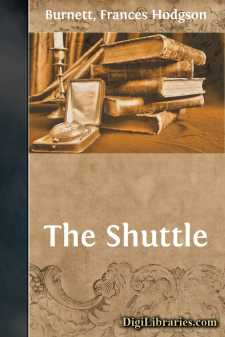Fiction
- Action & Adventure 180
- Biographical 15
- Christian 59
- Classics 6965
- Coming of Age 5
- Contemporary Women 3
- Erotica 8
- Espionage/Intrigue 12
- Fairy Tales, Folklore & Mythology 236
- Family Life 169
- Fantasy 117
- Gay 1
- General 596
- Ghost 32
- Historical 808
- Horror 43
- Humorous 160
- Jewish 25
- Legal 4
- Medical 22
- Mystery & Detective 315
- Political 49
- Psychological 41
- Religious 64
- Romance 159
- Sagas 11
- Science Fiction 730
- Sea Stories 113
- Short Stories (single author) 537
- Sports 10
- Suspense 1
- Technological 8
- Thrillers 2
- Urban Life 31
- Visionary & Metaphysical 1
- War & Military 173
- Westerns 199
Fiction Books
Sort by:
by:
Basil King
I Finding himself in the level wood-road, whose open aisle drew a long, straight streak across the sky, still luminous with the late-lingering Adirondack twilight, the tall young fugitive, hatless, coatless, and barefooted, paused a minute for reflection. As he paused, he listened; but all distinctiveness of sound was lost in the play of the wind, up hill and down dale, through chasm and over crag, in...
more...
(SCENE 1.) Enter Don Pedro Gusman, Henrico and Manuell, his sons; Don Fernando and Eleanora, his daughter, and Teniente. Pedr. Gentlemen, y'have much honourd me to takeSuch entertainement, but y'are welcome all.'Twas my desire to have your companyAt parting: heaven knowes when we shall meete againe. Ten. You are for France then too? Man. I wayte on my father. Pedr....
more...
by:
Max Simon Nordau
CHAPTER I. A more unequally matched couple than the cartwright Molnár and his wife can seldom be seen. When, on Sunday, the pair went to church through the main street of Kisfalu, an insignificant village in the Pesth county, every one looked after them, though every child, nay, every cur in the hamlet, knew them and, during the five years since their marriage, might have become accustomed to the...
more...
The German fast mail steamer, Roland, one of the older vessels of the North German Steamship Company, plying between Bremen and New York, left Bremen on the twenty-third of January, 1892. It had been built in English yards with none of those profuse, gorgeous gold decorations in a riotous rococo style which are so unpleasant in the saloons and cabins of ships more recently built in German yards. The...
more...
CHAPTER I THE SUBTERRANEAN WAY The slanting rays of afternoon sunshine, pouring through stone arches, lay in broad, golden bands, upon the flags of the Convent cloister. The old lay-sister, Mary Antony, stepped from the cool shade of the cell passage and, blinking at the sunshine, shuffled slowly to her appointed post at the top of the crypt steps, up which would shortly pass the silent procession of...
more...
CHAPTER I HUSBANDS AND WIFE. Brock was breakfasting out-of-doors in the cheerful little garden of the Hôtel Chatham. The sun streamed warmly upon the concrete floor of the court just beyond the row of palms and oleanders that fringed the rail against which his Herald rested, that he might read as he ran, so to speak. He was the only person having déjeuner on the "terrace," as he named it to...
more...
CHAPTER I THE WEAVING OF THE SHUTTLE No man knew when the Shuttle began its slow and heavy weaving from shore to shore, that it was held and guided by the great hand of Fate. Fate alone saw the meaning of the web it wove, the might of it, and its place in the making of a world's history. Men thought but little of either web or weaving, calling them by other names and lighter ones, for the time...
more...
The translation of Goethe's "Prose Maxims" now offered to the public is the first attempt that has yet been made to present the greater part of these incomparable sayings in English. In the complete collection they are over a thousand in number, and not more perhaps than a hundred and fifty have already found their way into our language, whether as contributions to magazines here and in...
more...
by:
Robert F. Young
The condensation of the histories of ten thousand races into a text concise enough to fit into a single volume had been a task of unprecedented proportions. There had been times when the Galactic Historian had doubted whether even his renowned abilities were up to the assignment that the Galactic Board of Education had so lightly tossed his way, times when he had thrown up his hands—all five of...
more...
CHAPTER I. THE WEST SEA SAILING. Long after King Estein had joined his fathers on the little holm beyond Hernersfiord, and Helgi, Earl of Askland, had become but a warlike memory, the skalds of Sogn still sang this tale of Vandrad the Viking. It contained much wonderful magic, and some astonishingly hard strokes, as they told it; but reading between their lines, the magic bears a strong resemblance to...
more...











